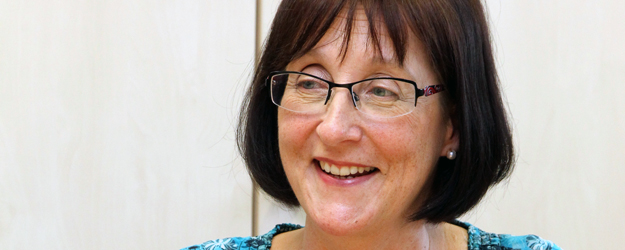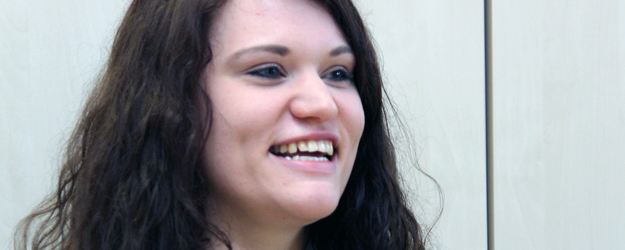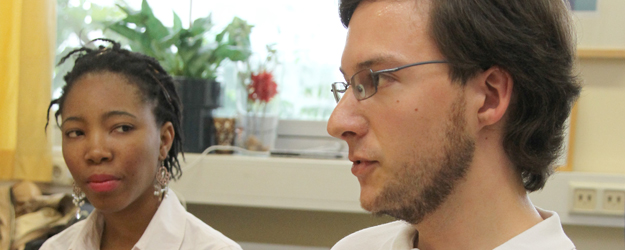29 June 2015
Want to study in Lithuania and Germany and then also in Sweden or Estonia? The international Master's degree program Sociolinguistics and Multilingualism – or 'SoMu' for short – makes it possible. Universities in all four countries are working together to provide insight into the multifaceted linguistic landscape, society, and history of the Baltic region. Professor Anneli Sarhimaa of the Northern European and Baltic Languages and Cultures research and teaching unit at Johannes Gutenberg University Mainz (JGU) has helped create this unique degree program.
Angela Gbandi is from Nigeria. Her German is still shaky as she has only been studying at Mainz University for a few months. She originally knew absolutely nothing about the Baltic region. She had heard about the Black Sea, but the Baltic Sea? The Baltic region and its history were completely unknown to the student. "But the more I looked into it, the more I discovered how fascinating the subject is."
She found parallels with her own homeland, a country with more than 500 languages and dialects – and she also noted stark differences. "When people ask which languages I speak, I tell them Igbo, Hausa, and English." The emphasis is on English, the most important language. "The others are completely unimportant internationally. But even so, we Nigerians are proud of our own languages." English is a legacy of colonialism, along with the disregard for indigenous languages.
From Nigeria to the Baltic Sea
While studying in the Baltic region, in Kaunas in Lithuania, Gbandi encountered a similar dynamic. Over decades, Soviet imperialism had tried to impose Russian as a replacement for the languages spoken in the tiny countries here. But when the Eastern bloc disintegrated, independent states arose – and Estonia, Latvia, and Lithuania proudly began to resuscitate their own languages.
As in the case of Nigeria, there are minority populations and their languages in the Baltic region that find themselves in competition with a powerful bloc and its language. "Perhaps I'll compare the processes more closely at some later point in time," says Gbandi. "It's possible that my insights may be useful at home."
The discussion in Professor Anneli Sarhimaa's office ranges over a broad field of topics. "I could not imagine it otherwise," says the Finn laughing, "it would be boring." She is a member of the Northern European and Baltic Languages and Cultures research and teaching unit of the Department of English and Linguistics at Johannes Gutenberg University Mainz, an institution truly unique in Europe. She is also one of the initiators of the International Master in Sociolinguistics and Multilingualism degree program, which launched in the 2013/2014 winter semester. She is now here with three of her students to tell us about it.
A space for many languages
"The idea for such a degree program was born in 2011." And for Sarhimaa the Baltic region was a quite obvious example, since it is here that Finno-Ugric, Baltic, and Germanic languages rub shoulders. Large and small languages and those spoken by only tiny groups together look back on a turbulent history. All this provides plenty of areas for investigation, such as linguistic variations or identities, the relationship between national and minority languages and much more.
The degree program is offered jointly by Vytautas Magnus University in Kaunas in Lithuania and Mainz University. Students receive a Master's degree from both universities. They spend their first semester in Lithuania and then they come to Mainz – like Angela Gbandi. Among other things, they learn the languages spoken in the two countries. "I am not learning Lithuanian and German just anywhere but actually in Lithuania and in Germany," stresses the Nigerian. "And by so doing, I am learning about the cultures, the countries, and the people." She will subsequently be going on to Tartu in Estonia or to Stockholm in Sweden as the universities there are also participating in the degree program.
Maren Gockel is already working on her Master's thesis. "It is due in ten days," she explains. From her voice, you can tell she's feeling the stress. But her tone changes completely when she talks of her studies, particularly the time in Kaunas and Stockholm. "I had never really before thought that much about the political and social processes in the Baltic region." But she, too, became fascinated. "We felt the effects of the Russian currency crisis up close. When you are actually there, everything is much more immediate. For example, I learned at first hand how important their language is to the Lithuanians."
Learning German in Sweden
The subject of her Master's thesis brought Gockel back to Germany, to Frankfurt am Main. She is looking at how language is dealt with in preschool facilities in view of the presence of many children with an immigrant background. At first, this seems to have little relevance to the focus of the degree program. "It is what makes the program so unique," counters the trained educator. "We are not forced to examine a predetermined topic and have the freedom to follow our own interests." Actually she is researching multilingualism and sociolinguistics, completely in keeping with the degree program.
Frederik Bissinger also only has ten days before he has to hand in his Master's thesis. "I've been looking at language policy in Sweden. How do they encourage people to learn German there and what impact does this have on other languages? Language policy is a sensitive subject. It can do a lot but also create just as many problems."
German is made attractive by stressing Germany's economic strength. "Germany is Sweden's most important trading partner." The fact that German is among the EU's working languages next to English and French is also emphasized. "Germany spends hundreds of millions of euros in promoting the German language abroad." Bissinger has noticed signs that a saturation point may have been reached in Sweden while German is also crowding out other smaller languages.
At Vytautas Magnus University, Bissinger discovered a small language for himself: Lithuanian. "I want to continue learning it," he says, "even after I finish my degree."
A successful start
The Sociolinguistics and Multilingualism Master's degree program has proved to be a success. "We started with six students," says Sarhimaa looking at Gockel and Bissinger. "The following year we had ten." She then glances at Gbandi. "And now we have 30 new enrollments."
The cooperation with Kaunas, Tartu, and Stockholm has been excellent. "We are in constant contact and the students receive extensive support." A few adjustments to the curriculum were needed after the first year. "I'm afraid you two suffered the consequences," Sarhimaa says, with a smiling glance at Bissinger and Gockel. But the two also benefited from the extremely low student count: "There had been hundreds of people in my Bachelor's degree program," recalls Bissinger, "Here we had three students from Lithuania and three from Germany. We all became friends."
"Our research into multilingualism is highly practical," adds Sarhimaa." We offer the perfect preparation for working in a multilingual and internationalized world." The students get the chance to
truly broaden their horizons – otherwise it would indeed be boring.



